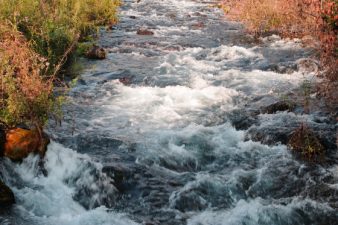
Israeli geothermal energy company Ormat is soaking up excess energy from an oil field in Wyoming.
One of the most interesting of the US Recovery Act geothermal funding recipients – it received $4.5 Million – is Ormat Industries, the Israel-based vertically integrated geothermal energy and waste heat recovery specialist. Working with the US Department of Energy, Ormat Technologies has the results of a two year test of the exploitation of a completely new and renewable energy source at a fully operational oil field in Wyoming, which the US Department of Energy makes available for trying out new technology.
Normally the hot water that drives a geothermal turbine system comes from naturally occurring geothermal hot springs. But Ormat is developing a way to use the oil and water found naturally during drilling to make energy by first separating out the oil, and then running the hot water through a heat recovery device, to make electricity.
The company is developing technology to use the relatively low-heat oilfield water (about 190° Fahrenheit) to boil a volatile working fluid is isopentane, which has a boiling point of 28 degrees C/82.4 degrees F to drive a turbine-powered electrical generator. This is much lower heat than traditional geothermal fluids which are ideally 400 – 500 ° Fahrenheit.
It’s very effective as a heat transfer fluid, as it changes states or phases readily from liquid to gas and back to liquid as it is pumped through the heat exchanger to take up the heat from the water, then it moves through the radiators and condenses or returns to a liquid state.
This means they can extract electricity from normally wasted co-ocurring fluids found during oilfield production. This has never been done. It has other applications in greening the rest of the fossil industry too.
The technology could have a significant effect on making not merely oil drilling greener but might also have an application in tar sands development and even spent gas wells.
By using the co-produced fluids – that are already compromised – by extracting more energy from them, the technology reduces the carbon emissions per unit of energy produced by fossil fuels. The oil industry has traditionally thrown away this geothermal heat resource.
So has it worked as expected? I checked back with Jim Nations of the Rocky Mountain Oilfield Testing Center at Wyoming’s Teapot Dome oil field, who I first spoke to last October, when another year was needed to get the results.
The Ormat unit has now consistently churned out about a million kilowatt hours a year for two years from its 250 KW unit, able to make electric power at fluid temperatures of just 190° Fahrenheit.
“Our test shows that co-produced fluids can be used in an oil field to produce electricity on-site, provided the water temperature and volume are sufficient”, he said, but cautioned, “this won’t apply to all oil fields due to these variables of temp and volume, but many fields could potentially benefit from being able to produce their own electricity”.
As oil declines, there is more water produced rather than oil, so this application of waste heat recovery is a way to reduce the energy costs of oil production in depleted oil fields.
“More water means less oil to sell relative to the electricity consumed, so older fields become uneconomic,” he told me.
This is why “older fields in particular may be able to benefit from this, as one of the limiting costs of continued oil production, when significantly more water than oil is being produced – at Teapot Dome it’s about 99 percent water to 1 percent oil per given volume – is the electricity consumed to run pumps to extract the fluids”.
Sounds like perfect product to soak up energy over the coming peak oil years.
Read more on Ormat:
Ormat gears up to develop its first geothermal plant in Alaska
Ormat Technologies: Heating Up the Geothermal Landscape
Ormat Industries – Israeli energy pioneer
Israel’s Ormat makes clean fuel that is good to go
Image: RMOTC


